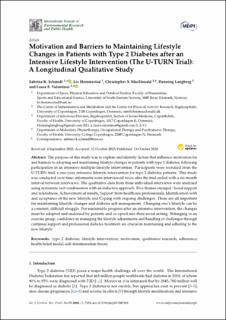| dc.contributor.author | Schmidt, Sabrina Krogh | |
| dc.contributor.author | Hemmestad, Liv B | |
| dc.contributor.author | MacDonald, Christopher | |
| dc.contributor.author | Langberg, Henning | |
| dc.contributor.author | Valentiner, Laura | |
| dc.date.accessioned | 2021-05-06T07:56:32Z | |
| dc.date.available | 2021-05-06T07:56:32Z | |
| dc.date.created | 2020-10-15T13:44:26Z | |
| dc.date.issued | 2020 | |
| dc.identifier.citation | Schmidt, S. K., Hemmestad, L., MacDonald, C. S., Langberg, H., & Valentiner, L. S. (2020). Motivation and Barriers to Maintaining Lifestyle Changes in Patients with Type 2 Diabetes after an Intensive Lifestyle Intervention (The U-TURN Trial): A Longitudinal Qualitative Study. International Journal of Environmental Research and Public Health (IJERPH), 17(20). | en_US |
| dc.identifier.issn | 1661-7827 | |
| dc.identifier.uri | https://hdl.handle.net/11250/2753816 | |
| dc.description.abstract | The purpose of this study was to explore and identify factors that influence motivation for and barriers to adopting and maintaining lifestyle changes in patients with type 2 diabetes, following participation in an intensive multiple-lifestyle intervention. Participants were recruited from the U-TURN trial, a one-year, intensive lifestyle intervention for type 2 diabetes patients. This study was conducted over time; informants were interviewed twice after the trial ended with a six-month interval between interviews. The qualitative data from these individual interviews were analysed using systematic text condensation with an inductive approach. Five themes emerged: Social support and relatedness, Achievement of results, Support from healthcare professionals, Identification with and acceptance of the new lifestyle and Coping with ongoing challenges. These are all important for maintaining lifestyle changes and diabetes self-management. Changing one’s lifestyle can be a constant, difficult struggle. For sustainable progress after an intensive intervention, the changes must be adopted and endorsed by patients and co-opted into their social setting. Belonging to an exercise group, confidence in managing the lifestyle adjustments and handling of challenges through continual support and professional diabetes treatment are crucial in maintaining and adhering to the new lifestyle. | en_US |
| dc.language.iso | eng | en_US |
| dc.rights | Navngivelse 4.0 Internasjonal | * |
| dc.rights.uri | http://creativecommons.org/licenses/by/4.0/deed.no | * |
| dc.title | Motivation and Barriers to Maintaining Lifestyle Changes in Patients with Type 2 Diabetes after an Intensive Lifestyle Intervention (The U-TURN Trial): A Longitudinal Qualitative Study | en_US |
| dc.type | Peer reviewed | en_US |
| dc.type | Journal article | en_US |
| dc.description.version | publishedVersion | en_US |
| dc.rights.holder | © The Author(s) 2020. | en_US |
| dc.source.volume | 17 | en_US |
| dc.source.journal | International Journal of Environmental Research and Public Health (IJERPH) | en_US |
| dc.source.issue | 20 | en_US |
| dc.identifier.doi | https://doi.org/10.3390/ijerph17207454 | |
| dc.identifier.cristin | 1839844 | |
| dc.source.articlenumber | 7454 | en_US |
| cristin.ispublished | true | |
| cristin.fulltext | original | |
| cristin.qualitycode | 1 | |

